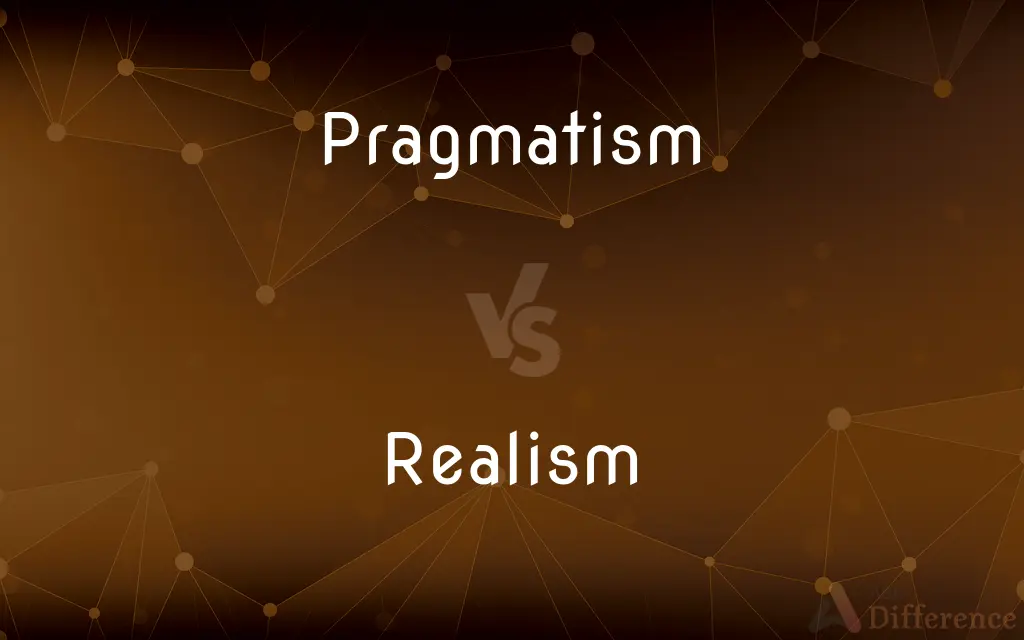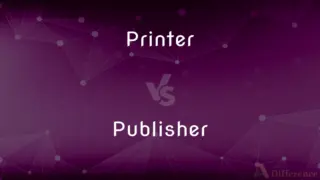Pragmatism vs. Realism — What's the Difference?
Edited by Tayyaba Rehman — By Urooj Arif — Updated on March 8, 2024
Pragmatism emphasizes practical approaches to problems and ideas based on their outcomes, while realism focuses on understanding and representing things as they truly are, irrespective of outcomes.

Difference Between Pragmatism and Realism
Table of Contents
ADVERTISEMENT
Key Differences
Pragmatism is a philosophical tradition that prioritizes the practical effects and outcomes of ideas, beliefs, and actions as the basis for their truth and value. It argues that the meaning of any concept is closely tied to its practical application and effect in the real world. Realism, on the other hand, is concerned with representing or understanding reality as it is, without distortion by personal biases, interpretations, or abstract theories. In philosophy, realism asserts that there exists an objective reality that is independent of our perceptions or beliefs.
Pragmatists are less concerned with abstract principles and more with what works in practice, advocating for flexibility, adaptability, and continuous inquiry. Realists emphasize the discovery and acknowledgement of truths that remain consistent regardless of human thought or experience.
Pragmatism values ideas and actions based on their practical outcomes and usefulness, suggesting that truths are not absolute but are validated through their applicability and success in solving problems. Realism, meanwhile, values the accuracy and fidelity of representation or belief to the objective world, suggesting that truths are discovered through careful observation and reasoning about the world as it exists independently of us.
While pragmatism focuses on the utility of ideas and their effects in guiding action, realism is more concerned with the ontological status of entities and the accurate depiction or understanding of the world. Pragmatists often view knowledge and truth as tools for navigating and interacting with the world, whereas realists see them as reflections of the world's inherent structure and nature.
Despite their differences, both pragmatism and realism aim to provide a grounding for knowledge and action. Pragmatism does so through a focus on outcomes and adaptability, while realism emphasizes the importance of objective truth and the reality external to human perception.
ADVERTISEMENT
Comparison Chart
Core Focus
Practical outcomes and utility
Objective reality and truth
Philosophical Approach
Values ideas based on practical effects
Emphasizes the discovery of inherent truths
Truth
Truths are validated through applicability
Truths exist independently of human thought
Concerns
Effectiveness, adaptability, problem-solving
Accuracy, fidelity, objective observation
Knowledge and Truth
Tools for action
Reflections of reality's structure
Compare with Definitions
Pragmatism
Philosophy prioritizing practical outcomes.
He approached the project with pragmatism, focusing on what solutions would effectively address the issue.
Realism
Philosophy asserting the existence of objective reality.
Her artwork reflects realism, capturing the raw beauty of nature without embellishment.
Pragmatism
Emphasizes actions based on results.
Her pragmatism led her to adopt the most efficient method, despite it being unconventional.
Realism
Values fidelity to reality.
In realism, understanding a phenomenon requires observing it as it truly exists, devoid of subjective bias.
Pragmatism
Considers truths to be practically proven.
From a pragmatist's view, an idea's value lies in its successful application.
Realism
Emphasizes accurate representation.
The novel's realism brought the historical period to life with detailed accuracy.
Pragmatism
Focuses on problem-solving.
His pragmatism was evident in how he prioritized actionable steps over theoretical discussions.
Realism
Concerned with truth independent of human perception.
Scientific realism seeks to uncover the truths about the natural world.
Pragmatism
Values adaptability and utility.
Pragmatism in policy-making involves choosing strategies that pragmatically solve problems.
Realism
Focuses on objective observation.
Realism in journalism involves reporting facts without distortion or interpretation.
Pragmatism
Pragmatism is a philosophical tradition that considers words and thought as tools and instruments for prediction, problem solving, and action, and rejects the idea that the function of thought is to describe, represent, or mirror reality. Pragmatists contend that most philosophical topics—such as the nature of knowledge, language, concepts, meaning, belief, and science—are all best viewed in terms of their practical uses and successes.
Realism
An inclination toward literal truth and pragmatism.
Pragmatism
A pragmatic attitude or policy
Ideology had been tempered with pragmatism
Realism
The representation in art or literature of objects, actions, or social conditions as they actually are, without idealization or presentation in abstract form.
Pragmatism
An approach that evaluates theories or beliefs in terms of the success of their practical application.
Realism
The scholastic doctrine, opposed to nominalism, that universals exist independently of their being thought.
Pragmatism
(Philosophy) A movement consisting of varying but associated theories, originally developed by Charles S. Peirce and William James and distinguished by the doctrine that the meaning or truth value of an idea or a proposition lies in its observable practical consequences.
Realism
The modern philosophical doctrine, opposed to idealism, that objects exist independently of their being perceived.
Pragmatism
A practical, matter-of-fact way of approaching or assessing situations or of solving problems.
Realism
A concern for fact or reality and rejection of the impractical and visionary.
Pragmatism
The pursuit of practicality over aesthetic qualities; a concentration on facts rather than emotions or ideals.
Realism
An artistic representation of reality as it is.
Pragmatism
(politics) The theory that political problems should be met with practical solutions rather than ideological ones.
Realism
(sciences) The viewpoint that an external reality exists independent of observation.
Pragmatism
(philosophy) The idea that beliefs are identified with the actions of a believer, and the truth of beliefs with success of those actions in securing a believer's goals; the doctrine that ideas must be looked at in terms of their practical effects and consequences.
Realism
(philosophy) A doctrine that universals are real—they exist and are distinct from the particulars that instantiate them.
Pragmatism
The habit of interfering in other people's affairs; meddlesomeness.
Realism
As opposed to nominalism, the doctrine that genera and species are real things or entities, existing independently of our conceptions. According to realism the Universal exists ante rem (Plato), or in re (Aristotle).
Pragmatism
The quality or state of being pragmatic; in literature, the pragmatic, or philosophical, method.
The narration of this apparently trifling circumstance belongs to the pragmatism of the history.
Realism
Fidelity to nature or to real life; representation without idealization, and making no appeal to the imagination; adherence to the actual fact.
Pragmatism
(philosophy) the doctrine that practical consequences are the criteria of knowledge and meaning and value
Realism
The practise of assessing facts and the probabilities of the consequences of actions in an objective manner; avoidance of unrealistic or impractical beliefs or efforts. Contrasted to idealism, self-deception, overoptimism, overimaginativeness, or visionariness.
Pragmatism
The attribute of accepting the facts of life and favoring practicality and literal truth
Realism
The attribute of accepting the facts of life and favoring practicality and literal truth
Realism
(philosophy) the philosophical doctrine that physical object continue to exist when not perceived
Realism
The state of being actual or real;
The reality of his situation slowly dawned on him
Realism
An artistic movement in 19th century France; artists and writers strove for detailed realistic and factual description
Realism
(philosophy) the philosophical doctrine that abstract concepts exist independent of their names
Common Curiosities
Why is pragmatism important in decision-making?
Pragmatism is important in decision-making because it emphasizes flexibility, adaptability, and the selection of strategies based on their effectiveness in achieving desired outcomes.
Can pragmatism and realism be complementary?
Yes, in some contexts, pragmatism and realism can complement each other, especially when practical solutions require an accurate understanding of reality.
How do pragmatism and realism differ in their approach to truth?
Pragmatism sees truth as validated by practical applicability and usefulness, whereas realism views truth as existing independently of human perceptions, to be discovered through observation.
How does a pragmatist view knowledge and truth?
A pragmatist views knowledge and truth as tools that serve practical purposes in solving problems and guiding human actions.
What is realism?
Realism is a philosophical and artistic doctrine that emphasizes representing or understanding reality as it truly is, without distortion.
How do pragmatism and realism approach the concept of truth differently?
Pragmatism approaches truth as a concept that gains meaning through its practical consequences and utility in real-world applications. Realism approaches truth as an objective reality that exists independently of our beliefs or perceptions, waiting to be discovered through careful observation and reasoning.
What is the significance of realism in philosophy?
The significance of realism in philosophy lies in its commitment to acknowledging an objective reality that exists independently of our perceptions, influencing various fields like metaphysics, epistemology, and ethics.
What is pragmatism?
Pragmatism is a philosophical doctrine that evaluates the truth and value of ideas based on their practical applications and outcomes.
What role does realism play in science and art?
In science, realism underpins efforts to uncover truths about the natural world through objective observation and experimentation. In art, it guides the faithful representation of subjects as they appear in reality.
How does pragmatism influence educational philosophies?
Pragmatism influences educational philosophies by advocating for learning through doing, emphasizing the importance of experience, problem-solving, and the application of knowledge in practical situations.
Can a pragmatic approach be applied in all situations?
While pragmatism is widely applicable, its effectiveness may vary depending on the context and the complexity of the problem, as some situations may require a deeper understanding of underlying principles beyond mere practicality.
Is realism always objective?
Realism strives for objectivity in its representation or understanding of reality, but the interpretation and expression of realist principles can still be influenced by individual perspectives.
Can pragmatism lead to ethical relativism?
Some critics argue that pragmatism's emphasis on practical outcomes over absolute principles could lead to ethical relativism, where the morality of actions is judged solely based on their consequences.
What challenges might realism face in representing reality?
Realism might face challenges in representing reality due to limitations in perception, the complexity of reality beyond human senses, and the subjective nature of interpreting and depicting reality.
How do pragmatism and realism view progress?
Pragmatism views progress as the outcome of practical actions and problem-solving strategies that improve human conditions. Realism views progress as the increased understanding and accurate representation of the objective world, leading to more effective actions and solutions.
Share Your Discovery

Previous Comparison
Printer vs. Publisher
Next Comparison
Canteen vs. RestaurantAuthor Spotlight
Written by
Urooj ArifUrooj is a skilled content writer at Ask Difference, known for her exceptional ability to simplify complex topics into engaging and informative content. With a passion for research and a flair for clear, concise writing, she consistently delivers articles that resonate with our diverse audience.
Edited by
Tayyaba RehmanTayyaba Rehman is a distinguished writer, currently serving as a primary contributor to askdifference.com. As a researcher in semantics and etymology, Tayyaba's passion for the complexity of languages and their distinctions has found a perfect home on the platform. Tayyaba delves into the intricacies of language, distinguishing between commonly confused words and phrases, thereby providing clarity for readers worldwide.
















































